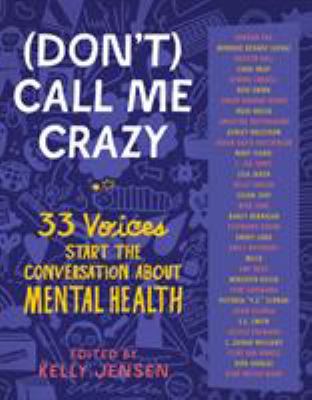Book review: (Don’t) Call Me Crazy
- angelgrey1969

- Feb 17, 2022
- 2 min read
33 Voices Start the Conversation About Mental Health
Algonquin Young Readers, 2018

To understand mental health, we need to talk open about it. This (Don’t) Call Me Crazy collection explores a wide range of topics, from the authors’ personal experiences with mental illness and understanding how our brains are wired, to exploring the do’s and don’ts of talking about mental health.—adapted from back cover
(Don’t) Call Me Crazy is a gathering of short stories, essays, poetry, and art published by American author and former librarian Kelly Jensen. Formatted like a scrapbook, the collection contains 33 works written by different authors who have in some way grappled with mental illness. They explore the personal and public dimensions of illness, including rhetoric about mental health, the science of the brain, and misconceptions and stereotypes. Taken as a whole, the works seek to normalize discourse about mental health, making clear that no one suffers in solitude.
This anthologycomprises a diverse range of authors and genres. In one, formatted as a comic strip, author Gemma Correll brings an illustrative depth to an anxiety disorder, inviting readers into her stylistic universe while suggesting that anxiety’s emotional universe is open to everybody. Another comic, by Yumi Sakugawa, uses calm imagery to transmit her journey from despising to loving her body and mind. Hannah Bae writes about growing up in a Korean American family with a paranoid mother and emotionally abusive father, and how she struggled to form an identity while constantly worrying about them. Bae ultimately left her parents to forge her own path, exchanging anxiety for guilt but soothing it through therapy.
Libba Bray personifies her obsessive-compulsive disorder and anxiety, while Stephanie Kuehn describes life with misophonia (selective sound sensitivity syndrome). Adam Silvera dispels the myth that successful or cheerful individuals don’t experience depression; Emery Lord seethes at the ignorant remarks about suicide she overhears at a Vincent van Gogh exhibit. Shaun David Hutchinson emphasizes that depression may live in your skin, but it does not control you. Monique Bedard offers a moving prose poem about the pernicious, lasting effects of the systemic abuse of Native women.
Jensen includes authors who are diverse along several spectra. Aside from a racially diverse cast, she includes LGBTQ voices and the voices of those who live with disabilities. In an essay by Shaun David Hutchinson, the author acknowledges that his depression is part of his identity, but not essential to it. He writes in response to the reductive language used by his boyfriend and employer that characterizes him as “depressed” first and foremost. Other authors, such as S. Jae-Jones, have similar problems with reductive language. Jae-Jones terminates a friendship after she finds that her friend has always seen her as a manic pixie dream girl. Having experienced a real manic episode, she knows exactly how damaging the stereotype can be. This anthology is a must read for those seeking to learn more about mental illness, families with loved ones that have disabilities, or as a reference or resource for any school library.











Comments